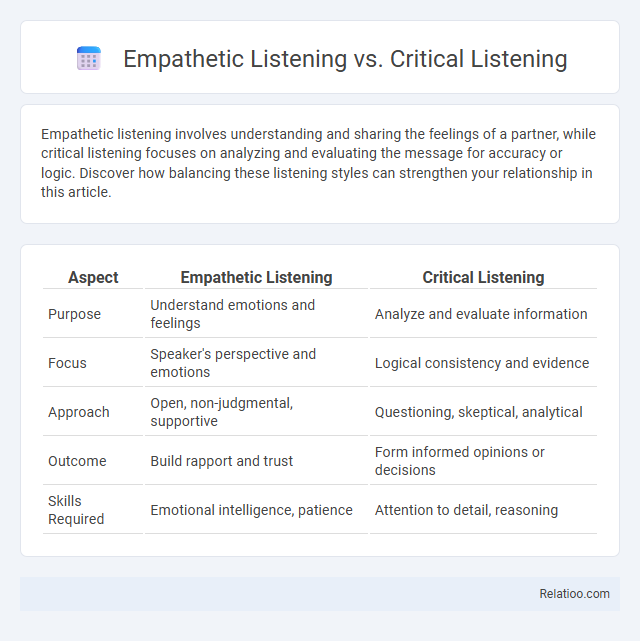Empathetic listening involves understanding and sharing the feelings of a partner, while critical listening focuses on analyzing and evaluating the message for accuracy or logic. Discover how balancing these listening styles can strengthen your relationship in this article.
Table of Comparison
| Aspect | Empathetic Listening | Critical Listening |
|---|---|---|
| Purpose | Understand emotions and feelings | Analyze and evaluate information |
| Focus | Speaker's perspective and emotions | Logical consistency and evidence |
| Approach | Open, non-judgmental, supportive | Questioning, skeptical, analytical |
| Outcome | Build rapport and trust | Form informed opinions or decisions |
| Skills Required | Emotional intelligence, patience | Attention to detail, reasoning |
Introduction to Listening Skills
Empathetic listening involves understanding and sharing the feelings of the speaker, fostering emotional connection and trust. Critical listening focuses on analyzing and evaluating the message for accuracy, logic, and relevance, essential for informed decision-making. Comprehension listening aims at accurately grasping the content and meaning of the message, forming the foundation for effective communication and learning.
Defining Empathetic Listening
Empathetic listening involves fully understanding and sharing the feelings of the speaker, creating a deep emotional connection that fosters trust and openness. Unlike critical listening, which evaluates and analyzes the content for accuracy and logical consistency, empathetic listening prioritizes emotional insight and genuine concern over judgment. This approach enhances comprehension by integrating emotional context with verbal messages, leading to more meaningful and supportive communication.
Understanding Critical Listening
Critical listening involves analyzing and evaluating the information you hear to make informed judgments, distinguishing it from empathetic listening that prioritizes emotional understanding and comprehension listening focused on basic grasp of meaning. This type of listening requires identifying biases, assessing the credibility of sources, and questioning underlying assumptions to fully understand the speaker's message. Developing critical listening skills enhances your ability to respond thoughtfully and avoid manipulation or misunderstanding.
Key Differences Between Empathetic and Critical Listening
Empathetic listening centers on understanding and sharing the speaker's emotions, fostering a supportive connection, whereas critical listening prioritizes evaluating the content's validity and logic for informed decision-making. Your ability to distinguish between these styles enhances communication by either providing emotional support or assessing arguments objectively. Comprehension links both by ensuring that you accurately grasp the message's meaning during any listening process.
Importance of Empathetic Listening in Communication
Empathetic listening plays a crucial role in communication by fostering trust, understanding, and emotional connection between participants, which enhances relationship-building and conflict resolution. Unlike critical listening, which focuses on evaluating and analyzing information, empathetic listening prioritizes emotional resonance and perspective-taking, leading to more effective and supportive interactions. Developing strong empathetic listening skills improves comprehension by allowing individuals to fully grasp not only the content but also the underlying feelings and intentions behind the message.
Role of Critical Listening in Decision-Making
Critical listening plays a pivotal role in decision-making by enabling you to evaluate arguments, assess evidence, and detect biases or inconsistencies in information. Unlike empathetic listening, which focuses on understanding emotions, and comprehension, which centers on grasping meaning, critical listening demands active analysis and judgment to support informed choices. Mastering critical listening enhances your ability to discern credible sources and make well-founded decisions in complex situations.
Benefits of Empathetic Listening
Empathetic listening enhances emotional connection by fully understanding and validating the speaker's feelings, leading to stronger relationships and trust. It fosters an environment of support and openness, which improves communication effectiveness and conflict resolution. Unlike critical listening, which primarily evaluates information, empathetic listening prioritizes emotional awareness and compassion, greatly benefiting personal and professional interactions.
Advantages of Critical Listening
Critical listening enhances Your decision-making by enabling the evaluation of arguments and identification of biases in speech. This type of listening promotes active engagement, improving information retention and critical thinking skills. Unlike empathetic listening or comprehension alone, critical listening equips You to assess credibility and make informed judgments in complex situations.
When to Use Empathetic vs Critical Listening
Empathetic listening is crucial when you seek to understand emotions and build trust during personal conversations or conflict resolution, focusing on the speaker's feelings and perspective. Critical listening is best applied in situations that require evaluation, analysis, or decision-making, such as assessing arguments, presentations, or complex information for accuracy and logic. Your ability to switch between empathetic and critical listening enhances communication effectiveness by addressing both emotional and intellectual needs.
Developing Effective Listening Strategies
Developing effective listening strategies requires distinguishing between empathetic listening, critical listening, and comprehension. Empathetic listening focuses on understanding emotions and building rapport, while critical listening emphasizes evaluating arguments and assessing credibility. Comprehension involves accurately grasping the overall message, enabling improved communication and decision-making skills.

Infographic: Empathetic Listening vs Critical Listening
 relatioo.com
relatioo.com